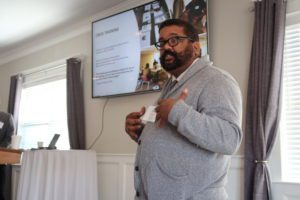Who is a member?
Our members are the local governments of Massachusetts and their elected and appointed leadership.

Earl Miller, director of Amherst’s new community responder department, describes the town’s process for handling nonviolent 911 calls.
During the Oct. 20 meeting of the Massachusetts Municipal Management Association in Bridgewater, public safety officials stressed the importance of partnerships, planning and pragmatism in transforming services for their residents.
Officials from Amherst, East Bridgewater and Hanover described their approaches to different aspects of public safety and health, including community responder services, active shooter training, and mobile integrated health. In each case, officials described obstacles they overcame and adjustments they had to make.
A few months ago, Amherst created a Community Responders for Equity, Safety and Service program, which sends trained responders to 911 calls that don’t require armed police involvement. The new department grew out of community discussions in the wake of the 2020 police killing of George Floyd in Minneapolis and nationwide calls for police reform.
The town considers CRESS – the first program of its kind in New England – as a third component of its public safety operations, along with traditional police and fire responses. CRESS Director Earl Miller said the departments keep in touch during incidents, and can quickly pivot if a situation ultimately does require police backup.
In the long term, Miller said, the success of a community responder service depends on mutual respect and collaboration among the departments.
“We made an agreement that ultimately the safety of the town was going to be our priority,” Miller said. “Not our egos, not our institutions, nobody but the residents of our town.”
East Bridgewater Police Sgt. Mike McLaughlin discussed the need for communities to prepare for active shooter incidents, and covered the Active Shooter/Hostile Event Response program, or ASHER, a framework for preparing for, responding to and recovering from such crises. He touched on related programs — ALICE (Alert, Lockdown, Inform, Counter, Evade) and CRASE (Civilian Response to Active Shooter Events) — that train individuals to survive violent incidents.
Managers described their concerns about municipal building security, given their public accessibility.
McLaughlin said municipal leaders should:
• Share building schematics with public safety officials
• Learn which rooms can be locked, can’t be locked, or can be barricaded
• Check that all building keys actually work
• Make sure intercom announcements can be heard by everyone
• Develop communications plans immediately if they don’t already have them
McLaughlin said officials need to be prepared for helping wounded individuals during an active incident, since police and fire responders aren’t able to treat victims until the shooting stops. Communities should also plan for maintaining continuity of services if municipal buildings become crime scenes, and establish partnerships with organizations that can provide post-incident support to the community.
“Who’s going to help you with your community if something happens at town hall or at the DPW?” McLaughlin asked.
Hanover Fire Chief Jason Cavallaro discussed mobile integrated health, which focuses on the use of mobile health resources (such as emergency medical services and paramedics) and partnerships with community health care stakeholders to treat people in the community rather than in hospital settings.
Hanover had explored a mobile integrated health program before the pandemic, Cavallaro said, and built relationships with community health care providers, but the town ran into procedural obstacles and prohibitive costs. When the state dropped fees and provided temporary MIH waivers during the pandemic, the town seized the opportunity and built an award-winning COVID-testing program for students, school staff and residents. He said the town’s earlier legwork and relationship-building allowed officials to act quickly.
“We knew what we wanted to do, we knew how we could do it, and everyone had already bought into the concept,” Cavallaro said. “We just needed a reason to do it, and we needed a way to do it, and COVID was the way to do it.”
Hanover employees found pragmatic ways to speed up testing results, keep infected students and staff out of the schools, and keep school buildings open, Cavallaro said. Partnering with the Broad Institute in Cambridge to conduct the daily testing, Hanover had a medic drive the tests to Cambridge every afternoon to beat the rush of the institute’s other clients, who used a slower courier service. To prevent infections from spreading in the schools, he said, school nurses began reviewing new test results at 4 a.m. so they could stop infected and exposed children from getting on the bus that morning.
Also at the meeting, Sean Cronin, senior deputy commissioner at the Division of Local Services, gave an update on the new Local Finance Commonwealth Fellowship program to train more municipal finance professionals.